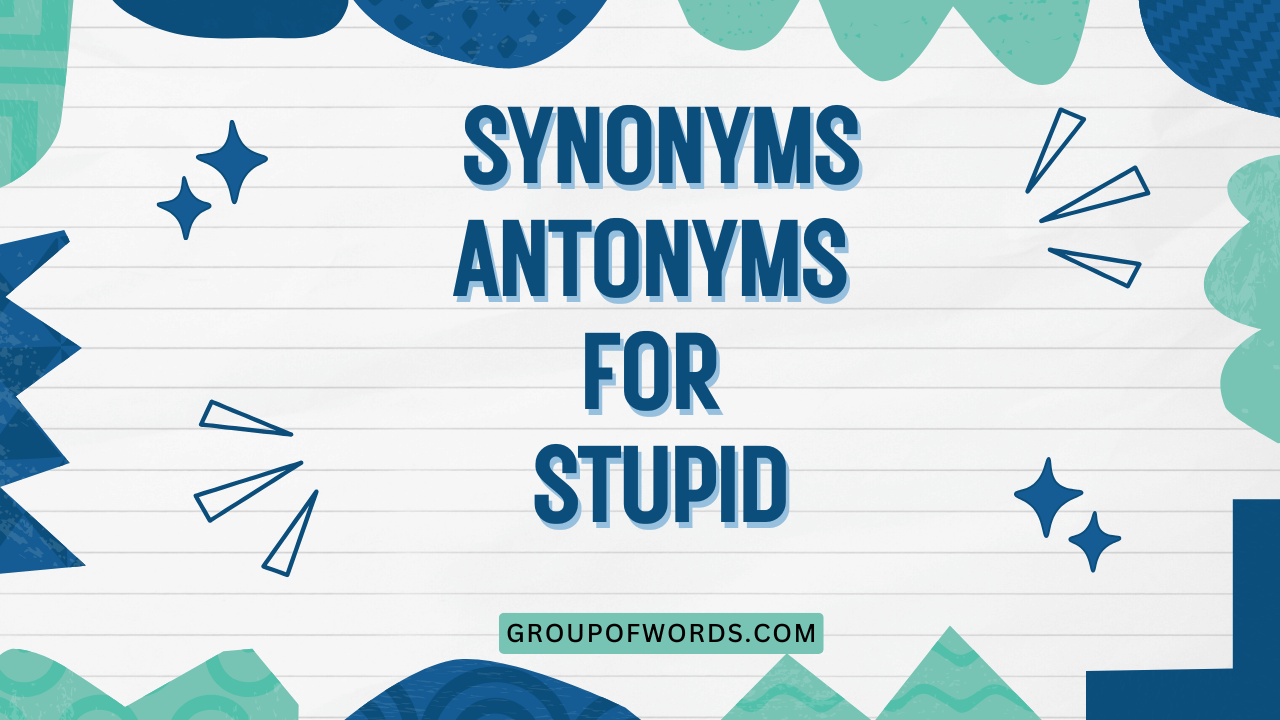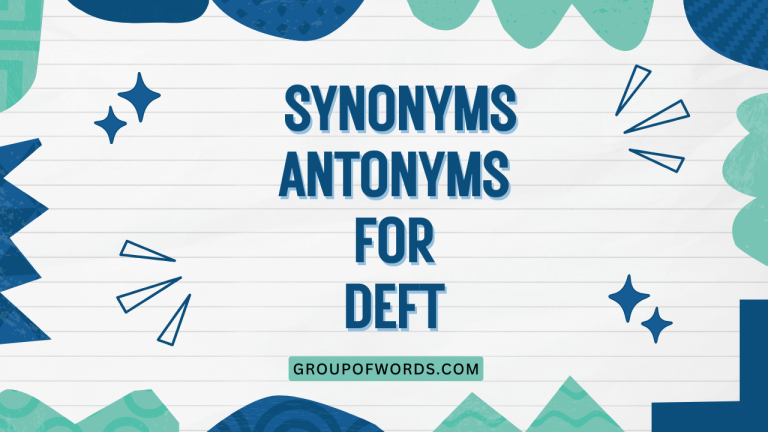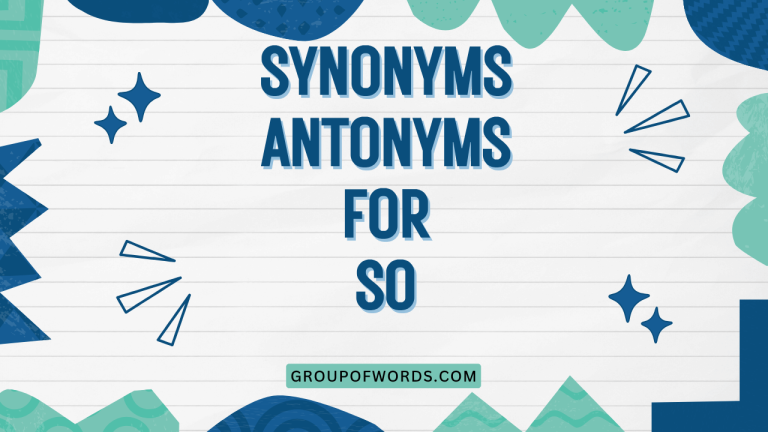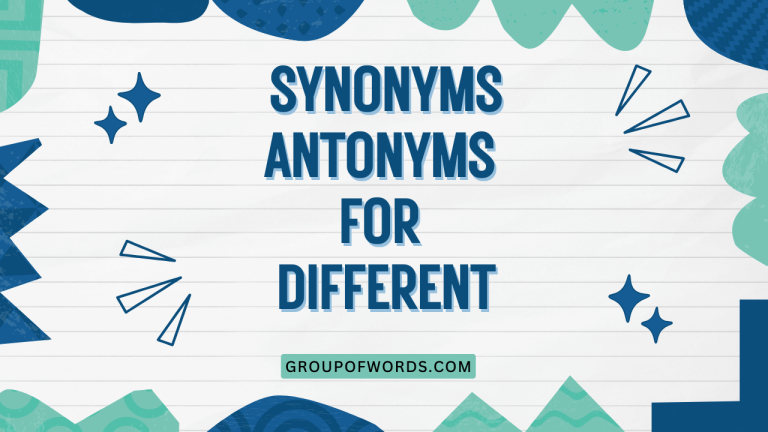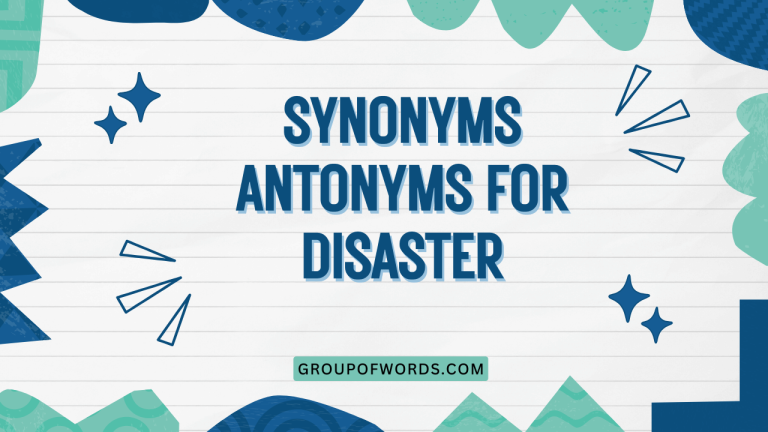Synonyms & Antonyms for “Stupid”: A Comprehensive Guide
Understanding synonyms and antonyms is crucial for expanding vocabulary and enhancing communication skills. This article focuses on exploring synonyms and antonyms for the word “stupid,” a term often used to describe a lack of intelligence or understanding.
By examining a wide range of related words, we can gain a more nuanced understanding of how to express different degrees of foolishness, ignorance, or absurdity. This comprehensive guide is designed for English language learners, writers, and anyone looking to refine their vocabulary and express themselves more precisely.
Whether you’re aiming to avoid using the word “stupid” directly, or simply want to add variety to your language, this article provides the resources you need. From formal to informal terms, and from mild to harsh expressions, we will cover a spectrum of alternatives.
Through detailed explanations, examples, and practice exercises, you’ll learn how to choose the most appropriate word for any given context.
Table of Contents
- Definition of “Stupid”
- Structural Breakdown
- Types and Categories of Synonyms and Antonyms
- Examples of Synonyms and Antonyms
- Usage Rules
- Common Mistakes
- Practice Exercises
- Advanced Topics
- FAQ
- Conclusion
Definition of “Stupid”
The word “stupid” is an adjective used to describe someone who lacks intelligence, understanding, or common sense. It can also refer to something that is foolish, senseless, or absurd.
The term carries a negative connotation and is often considered derogatory, depending on the context and tone in which it is used. It is important to consider the impact of using this word and to be mindful of the feelings of others.
In more formal terms, “stupid” can be seen as the opposite of “intelligent,” “wise,” or “clever.” However, the directness of “stupid” often makes it a stronger, more critical term than simply stating someone is “not intelligent.” The word can describe both inherent intellectual capacity and temporary lapses in judgment. For instance, you might say someone is inherently “stupid” if they consistently demonstrate a lack of understanding.
Alternatively, you might describe a single action as “stupid” if it was particularly ill-advised or lacking in foresight.
The word “stupid” functions primarily as an adjective, modifying nouns to indicate a lack of intelligence or sense. It can also be used as a noun in informal contexts, referring to a stupid person (e.g., “He’s such a stupid.”).
However, this usage is generally considered impolite. The context in which “stupid” is used dramatically affects its perceived severity.
A playful remark among friends will be received differently than a formal critique using the same word. Therefore, it is essential to choose alternative vocabulary that accurately reflects the intended meaning and tone.
Structural Breakdown
The word “stupid” is relatively simple in its structure. It is a single morpheme word, meaning it cannot be broken down into smaller meaningful units.
Its grammatical function is primarily adjectival, modifying nouns and pronouns. However, understanding the nuances of its usage requires exploring the various synonyms and antonyms that can replace it in different contexts.
The word “stupid” can be intensified using adverbs like “very,” “extremely,” or “incredibly.” For example, “That was a very stupid thing to do.” The intensity of the adverb amplifies the negative connotation of “stupid.” Furthermore, the word can be used in comparative and superlative forms, such as “stupider” and “stupidest,” although these forms are less common and can sound awkward in formal writing. Instead of using “stupider,” phrases like “more stupid” or “less intelligent” are often preferred.
To effectively replace “stupid,” it’s crucial to consider the sentence structure and the intended meaning. For instance, if the sentence is “He made a stupid mistake,” potential replacements could include “foolish mistake,” “careless error,” or “ill-advised decision.” The choice depends on the specific nuance you want to convey.
Understanding the structural role of “stupid” in a sentence helps in selecting a synonym that fits grammatically and semantically. This involves examining the surrounding words, the overall tone, and the context in which the statement is made.
The goal is to replace “stupid” with a word or phrase that maintains the sentence’s grammatical integrity and accurately reflects the intended meaning.
Types and Categories of Synonyms and Antonyms
Synonyms and antonyms for “stupid” can be categorized based on formality, intensity, and specific meaning. These categories help in selecting the most appropriate word for different situations and audiences.
Formal Synonyms
Formal synonyms for “stupid” are suitable for academic writing, professional settings, and other situations where precision and politeness are important. These words often carry a less emotionally charged tone than “stupid”.
- Unintelligent: Lacking in intelligence or mental capacity.
- Ignorant: Lacking knowledge or awareness.
- Dense: Slow to understand; lacking penetration.
- Imprudent: Not showing care for the consequences of an action; rash.
- Inane: Silly or empty.
Informal Synonyms
Informal synonyms are appropriate for casual conversations, friendly banter, and situations where a more relaxed tone is acceptable. These words often carry a stronger emotional charge and might be considered offensive in formal settings.
- Dumb: Lacking intelligence; foolish.
- Silly: Foolish or lacking in seriousness.
- Goofy: Foolish or absurd.
- Brainless: Lacking intelligence.
- Airheaded: Scatterbrained or lacking serious thought.
Mild Synonyms
Mild synonyms are used to soften the criticism and avoid causing offense. These words convey a lack of intelligence or understanding in a gentle way.
They are useful when you want to express disapproval without being harsh.
- Foolish: Lacking good sense or judgment.
- Naive: Lacking experience, wisdom, or judgment.
- Simple: Unsophisticated or uncomplicated.
- Unwise: Showing poor judgment.
- Shortsighted: Lacking foresight or planning.
Harsh Synonyms
Harsh synonyms are used to express strong disapproval or contempt. These words are often offensive and should be used with caution.
They are appropriate only in situations where a strong emotional response is warranted, and you are willing to risk offending the listener.
- Idiotic: Extremely stupid or foolish.
- Moronic: Very stupid or foolish.
- Imbecilic: Extremely stupid; idiotic.
- Retarded: (Offensive) Slow or limited in mental development.
- Asinine: Extremely stupid or foolish.
Antonyms for “Stupid”
Antonyms are words that have the opposite meaning of “stupid.” These words describe intelligence, wisdom, and good judgment.
- Intelligent: Having or showing intelligence.
- Smart: Having or showing quick-witted intelligence.
- Wise: Having or showing experience, knowledge, and good judgment.
- Clever: Quick to understand, learn, and devise or apply ideas; intelligent.
- Brilliant: Exceptionally intelligent or talented.
Examples of Synonyms and Antonyms
To illustrate the usage of synonyms and antonyms for “stupid,” here are several examples in sentences. These examples demonstrate how different words can be used to convey similar or opposite meanings in various contexts.
Synonyms in Sentences
The following table provides examples of synonyms for “stupid” used in sentences. The table is divided by the type of synonym (Formal, Informal, Mild, Harsh) to provide context and demonstrate appropriate usage.
| Category | Synonym | Example Sentence |
|---|---|---|
| Formal | Unintelligent | His unintelligent remarks revealed his lack of understanding of the subject. |
| Formal | Ignorant | It would be ignorant to assume that all cultures share the same values. |
| Formal | Dense | He’s rather dense when it comes to understanding complex instructions. |
| Formal | Imprudent | It was imprudent of him to invest all his savings in a risky venture. |
| Formal | Inane | The politician’s speech was filled with inane platitudes. |
| Informal | Dumb | That was a really dumb thing to say. |
| Informal | Silly | Don’t be silly; you know that’s not true. |
| Informal | Goofy | He made a goofy face to make the baby laugh. |
| Informal | Brainless | That was a completely brainless decision. |
| Informal | Airheaded | She’s a bit airheaded, but she has a good heart. |
| Mild | Foolish | It was foolish to go out without a coat in this weather. |
| Mild | Naive | She was naive to believe everything he told her. |
| Mild | Simple | He’s a simple man with simple tastes. |
| Mild | Unwise | It would be unwise to ignore the warning signs. |
| Mild | Shortsighted | His decision was shortsighted and lacked long-term planning. |
| Harsh | Idiotic | That was an idiotic thing to do. |
| Harsh | Moronic | Only a moronic person would believe that. |
| Harsh | Imbecilic | His imbecilic behavior was completely unacceptable. |
| Harsh | Asinine | That’s an asinine suggestion. |
| Harsh | Retarded | (Avoid Using) That’s a retarded idea. (Offensive) |
This table showcases the various ways you can express the idea of “stupid” using different synonyms, each with its own level of formality and intensity. By understanding these nuances, you can choose the most appropriate word for any given context.
Antonyms in Sentences
The following table provides examples of antonyms for “stupid” used in sentences. These examples demonstrate the opposite qualities of intelligence, wisdom, and good judgment.
| Antonym | Example Sentence |
|---|---|
| Intelligent | She is an intelligent student who excels in all her subjects. |
| Smart | He is a smart businessman with a keen eye for opportunity. |
| Wise | The wise old woman offered valuable advice to the young couple. |
| Clever | She is a clever writer who can craft compelling stories. |
| Brilliant | He is a brilliant scientist who has made groundbreaking discoveries. |
| Astute | The astute detective solved the mystery with ease. |
| Sagacious | The sagacious leader made decisions that benefited the entire community. |
| Perceptive | Her perceptive insights into human nature were invaluable. |
| Erudite | The erudite professor impressed his students with his vast knowledge. |
| Ingenious | The ingenious inventor created a device that revolutionized the industry. |
This table illustrates how antonyms can be used to describe individuals who possess intelligence, wisdom, and good judgment, offering a contrast to the concept of “stupid.”
Usage Rules
When choosing a synonym or antonym for “stupid,” consider the following usage rules to ensure accuracy and appropriateness:
- Context: The context of the sentence or conversation is crucial. A word that is appropriate in one situation may be offensive or inappropriate in another.
- Formality: Choose words that match the level of formality required by the situation. Formal settings require formal language, while casual settings allow for more informal expressions.
- Intensity: Consider the degree of disapproval or criticism you want to convey. Mild synonyms are suitable for gentle criticism, while harsh synonyms are reserved for strong disapproval.
- Audience: Be mindful of your audience. Avoid using words that may be offensive or hurtful to others.
- Specificity: Choose words that accurately reflect the specific type of lack of intelligence or understanding you want to describe. For example, “ignorant” implies a lack of knowledge, while “foolish” implies a lack of good judgment.
It’s important to understand that some synonyms, particularly the harsher ones, can be considered offensive and should be used with caution. Always consider the potential impact of your words on others and choose your language accordingly.
Furthermore, pay attention to the grammatical structure of the sentence when replacing “stupid.” Ensure that the synonym you choose fits grammatically and maintains the intended meaning. This might involve adjusting the sentence structure slightly to accommodate the new word.
Common Mistakes
Here are some common mistakes to avoid when using synonyms and antonyms for “stupid”:
| Incorrect | Correct | Explanation |
|---|---|---|
| He is a very unintelligent joke. | He told a very unintelligent joke. | “Unintelligent” should modify the joke itself, not be used as an adjective describing a person. |
| She is too dense to understand the situation. | She is too naive to understand the situation. | “Dense” implies slow understanding, while “naive” implies a lack of experience or awareness. The correct word depends on the intended meaning. |
| That was a brilliant mistake. | That was a foolish mistake. | “Brilliant” is an antonym of “stupid” and cannot be used to describe a mistake. |
| He acted wisdomly. | He acted wisely. | “Wisdomly” is not a word. The correct adverb form is “wisely.” |
| They are ignoranting the facts. | They are ignoring the facts. | “Ignoranting” is not a correct verb form. The correct verb is “ignoring.” “Ignorant” is an adjective. |
Avoiding these common mistakes will help you use synonyms and antonyms for “stupid” more accurately and effectively. Always double-check your word choices to ensure they fit the context and convey the intended meaning.
Practice Exercises
Test your understanding of synonyms and antonyms for “stupid” with these practice exercises.
-
Replace the word “stupid” with a more appropriate synonym in the following sentence: “That was a stupid thing to do.”
Possible answers: foolish, unwise, imprudent
-
Choose the best antonym for “stupid” to complete the sentence: “She is a very ______ student.”
Possible answers: intelligent, smart, clever
-
Rewrite the sentence using a more formal synonym for “stupid”: “He made a stupid mistake.”
Possible answers: He made an imprudent mistake. He made an unintelligent error.
-
Identify the synonym for “stupid” that carries the harshest connotation: foolish, idiotic, unwise.
Answer: idiotic
-
Complete the sentence with a suitable synonym for “stupid”: “It would be ______ to ignore the warning signs.”
Possible answers: foolish, unwise, imprudent
| Question | Answer |
|---|---|
| Replace “stupid” with a mild synonym: “He asked a stupid question.” | He asked a foolish question. |
| What is an antonym for “stupid” that describes someone with great knowledge? | Erudite |
| Rewrite using a less offensive term: “That was a stupid idea.” | That was an ill-advised idea. |
| Choose the most formal synonym: “The plan was stupid.” (ignorant, imprudent, silly) | Imprudent |
| What’s an antonym suggesting quick-wittedness instead of intelligence? | Clever |
| Replace “stupid” with a harsh synonym: “His behavior was stupid.” | His behavior was idiotic. |
| Choose the best synonym for “stupid” in this sentence: “He’s too _____ to understand the instructions.” (dense, silly, brilliant) | Dense |
| Complete with an antonym: “Despite the challenge, she remained _____ and focused.” | Intelligent |
| What is a formal synonym for “stupid”, indicating a lack of knowledge? | Ignorant |
| Replace “stupid” with a synonym that emphasizes a lack of foresight: “It was a stupid decision.” | It was a shortsighted decision. |
Advanced Topics
For advanced learners, exploring the etymology and historical usage of “stupid” and its synonyms can provide a deeper understanding of their nuances. Consider researching the origins of words like “idiot,” “moron,” and “imbecile,” and how their meanings have evolved over time.
Additionally, analyze how different cultures and languages express the concept of “stupidity” and the cultural connotations associated with these terms. This exploration can enhance your ability to use these words with sensitivity and precision.
Another advanced topic is the study of cognitive biases and logical fallacies, which often underlie actions or beliefs that are perceived as “stupid.” Understanding these biases and fallacies can help you analyze and critique arguments more effectively and avoid making foolish decisions yourself. Furthermore, consider the role of context and perspective in determining what is considered “stupid.” What might seem foolish to one person may be perfectly reasonable to another, depending on their background, experiences, and values.
Finally, explore the use of irony and satire in expressing the concept of “stupidity.” Writers and comedians often use irony and satire to critique foolish behavior or beliefs in a humorous and thought-provoking way. Analyzing these techniques can enhance your understanding of how language can be used to convey complex and nuanced meanings.
FAQ
-
Q: Is it always rude to call someone “stupid”?
A: Yes, generally speaking, calling someone “stupid” is considered rude and offensive. It’s usually better to use more tactful language or focus on specific behaviors instead of labeling someone as “stupid.”
-
Q: What’s the difference between “stupid” and “ignorant”?
A: “Stupid” implies a general lack of intelligence or understanding, while “ignorant” specifically means lacking knowledge about a particular subject. Someone can be intelligent but still be ignorant about certain things.
-
Q: Are there any situations where it’s okay to use the word “stupid”?
A: In very informal settings among close friends, it might be acceptable to use “stupid” playfully. However, it’s always important to consider your audience and the potential for offense.
-
Q: What are some less offensive ways to say someone is not very smart?
A: You could say they are “not the sharpest tool in the shed,” “a bit slow,” “lacking common sense,” or “not very knowledgeable” depending on the context.
-
Q: How can I avoid using offensive language when criticizing someone’s intelligence?
A: Focus on specific actions or statements rather than making general judgments about their intelligence. For example, instead of saying “That was a stupid thing to do,” you could say “That decision was not well thought out.”
-
Q: What are some formal synonyms for “stupid” that I can use in academic writing?
A: Some formal synonyms include “unintelligent,” “ignorant,” “imprudent,” and “inane.”
-
Q: How do I choose the right synonym for “stupid” in a given situation?
A: Consider the context, formality, intensity, and your audience. Choose a word that accurately reflects the specific type of lack of intelligence or understanding you want to describe and that is appropriate for the situation and your audience.
-
Q: If I want to convey someone is temporarily acting without thinking, what’s a good synonym?
A: “Thoughtless,” “rash,” or “impulsive” would be good choices, as they imply a momentary lapse in judgment rather than a permanent lack of intelligence.
Conclusion
Mastering the use of synonyms and antonyms for “stupid” is an essential step in expanding your vocabulary and refining your communication skills. By understanding the nuances of different words and their appropriate contexts, you can express yourself more precisely and avoid causing offense.
This comprehensive guide has provided you with a range of alternatives, from formal to informal, and from mild to harsh, along with examples, usage rules, and practice exercises.
Remember to consider the context, formality, intensity, and your audience when choosing a synonym or antonym for “stupid.” Be mindful of the potential impact of your words on others and choose your language accordingly. With practice and attention to detail, you can effectively replace “stupid” with a word or phrase that accurately reflects your intended meaning and tone.
The key is to constantly practice and expand your vocabulary, using resources like dictionaries, thesauruses, and online language tools. Pay attention to how native speakers use these words in different contexts, and don’t be afraid to experiment with new expressions.
Ultimately, effective communication is about choosing the right words to convey your message clearly and respectfully. By mastering the art of synonym and antonym usage, you can become a more confident and articulate speaker and writer.
Continue to explore the richness and complexity of the English language, and you will find that your ability to express yourself with precision and grace will continue to grow.
